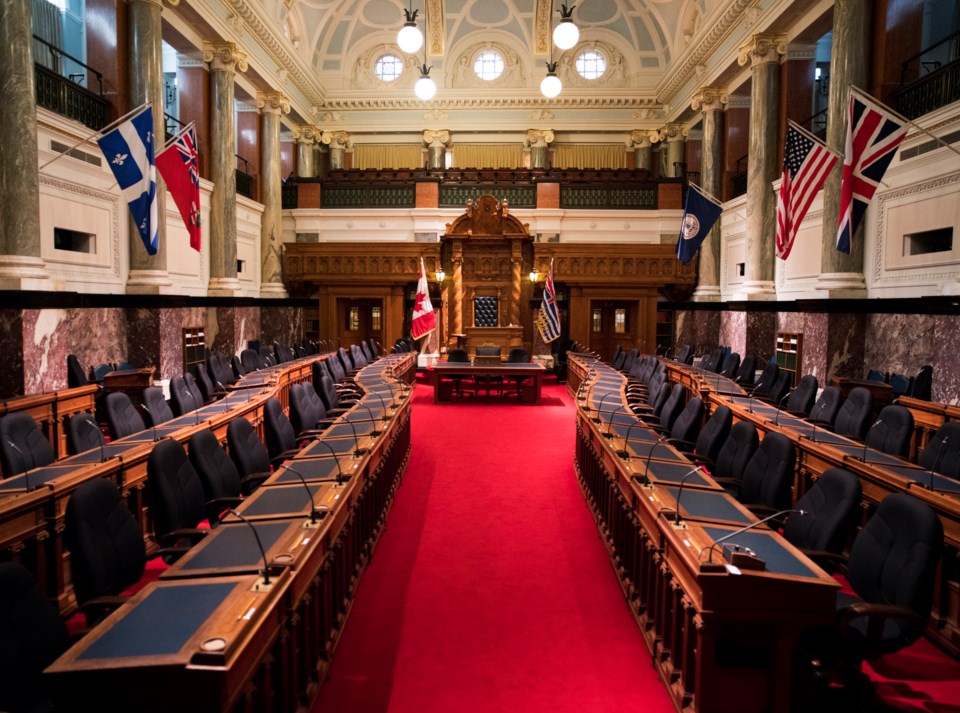B.C. politicians missed a rare opportunity to redesign how debate is done at the legislature, with the goal of lowering the toxicity level, even just a tiny bit.
MLAs on the all-party legislature management committee last week had to decide where to fit six new politicians set to arrive from six new ridings created for next year’s provincial election. The changes will increase the number of politicians from 87 to 93 starting in 2024.
The committee could have dramatically changed things up in the legislative chamber — everything from benches without desks, to designated speaking areas, to even a cross-party seating configuration that would mix political backbenchers.
Unfortunately, MLAs took the cheap and easy way out. Except, it wasn’t even cheap. The committee voted to spend $300,000 getting custom, hand-crafted, wooden desks built for the six new MLAs, and then squishing the aisles closer together, building some new risers along the wall and jamming those desks anywhere they could find a few spare inches of space.
The result is a claustrophobic mess, which renders at least half the chamber inaccessible to wheelchairs and MLAs who require mobility aids.
Green MLA Adam Olsen, who is on the committee but missed the meeting, said he’s deeply disappointed in the move.
Had the legislature switched to bench seating, for example, it could have eliminated the odious practice of MLAs banging on the tops of desks during question period, he said.
“We have this model of how the room should look because that's the way that it's always looked, and there is no creative discussion about how we can best design a room to achieve the job that we have,” said Olsen.
“Right now we have a room that achieves a certain outcome which is partisanship, which is division, which is members smashing desks in order to, you know, whoever can smash their desk the loudest.
“Those desks have suffered so much abuse, we should give them a break and let them go and perhaps we would get a different outcomes.”
The House of Commons in the United Kingdom uses benches without desks, though, to be fair, it’s not exactly a bastion of political civility either.
MLAs on the B.C. committee concluded it would take too long to build benches and cost too much money. No cost estimates were provided.
“Cabinet ministers have to do work, and there’s no doubt that desks of some kind are needed for that,” said Olsen. “But certainly for the regular business of our legislative assembly, desks are not required.
“In fact, it seems like there’s an inclination to design around a desk rather than designing around members that get elected to the room.”
Others zeroed in on the cost of the new desks, which also include some carpentry and electrical work done by legislature staff, as well as reconfiguring the Hansard broadcast cameras.
“I can appreciate the logistics are challenging, but I think my shock, frankly, is that it was $300,000,” said Cariboo-Chilcotin BC United MLA Lorne Doerskon, a committee member.
“I can picture a house in Williams Lake for $300,000, albeit not a big fancy one, but certainly a home.”
The legislature has a long history of outrageously expensive spending.
Former Speaker Linda Reid commissioned a $744 muffin rack to hold free snacks in the MLA lounge, along with a $48,000 custom touch-screen computer terminal for the chair in front of the Speaker’s throne.
Then there was the unnecessary $13,000 wood splitter that landed former clerk Craig James in trouble. James was eventually found guilty of fraud and breach of trust over expensing work clothes.
Despite the kerfuffle over desks, the new reconfiguration of the chamber is likely only temporary.
After every two elections, the law stipulates an Electoral Boundaries Commission is convened to adjust the ridings. With B.C.’s population continuing to grow, you can expect the 93 MLAs in 2024 to increase again in 2032.
There doesn’t appear to be any real long-term planning on how to fit all the future MLAs into the increasingly-cramped chamber, other than to roll with last-minute desk-making contracts.
It’s a problem MLAs would be wise to start wrapping their heads around at some point. Everyone agrees toxicity and partisanship in politics is a growing problem. Maybe tackling it involves breaking with tradition and redesigning the chamber the politicians work in.
Rob Shaw has spent more than 15 years covering B.C. politics, now reporting for CHEK News and writing for Glacier Media. He is the co-author of the national bestselling book A Matter of Confidence, host of the weekly podcast Political Capital, and a regular guest on CBC Radio. [email protected]

